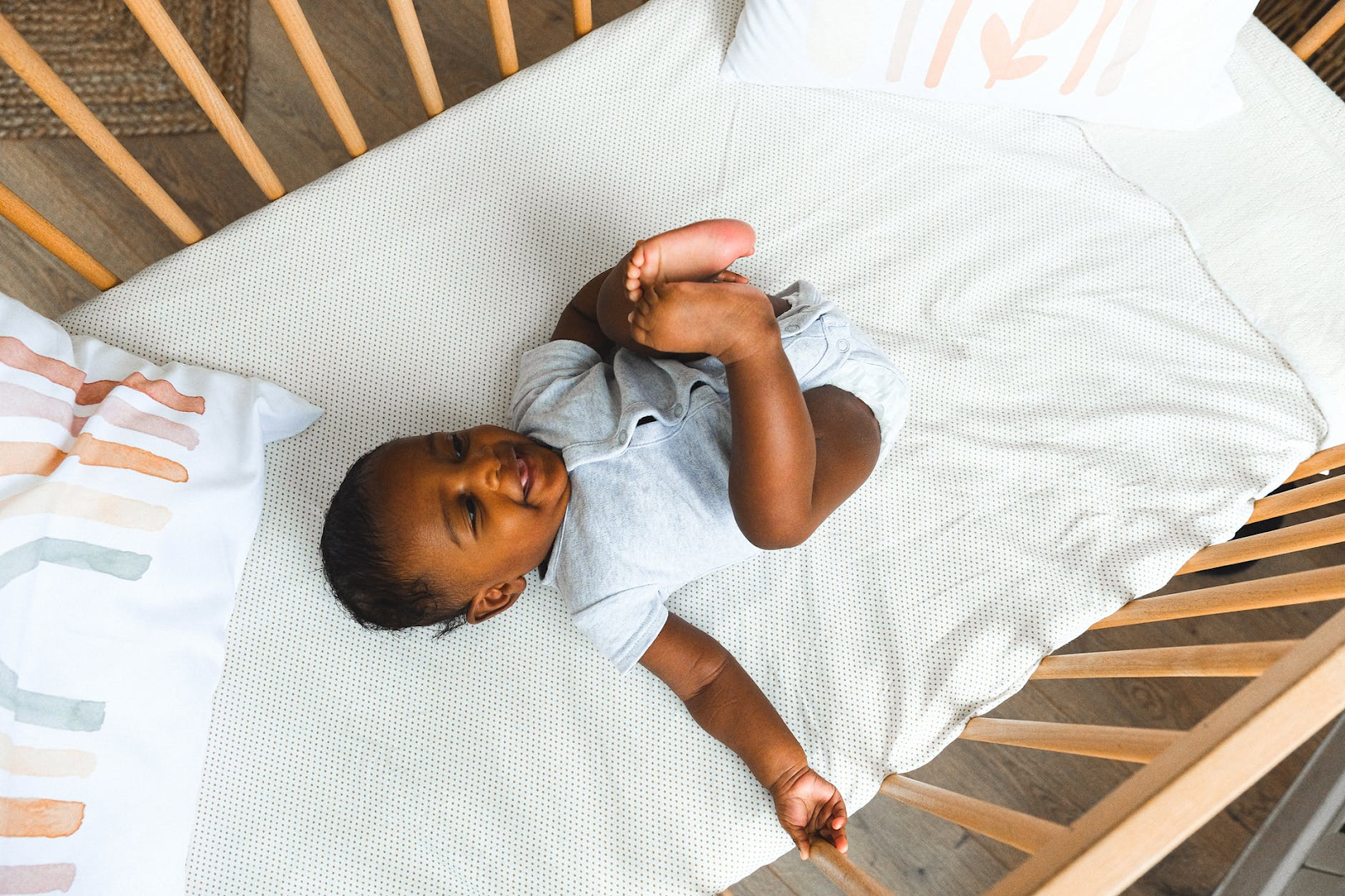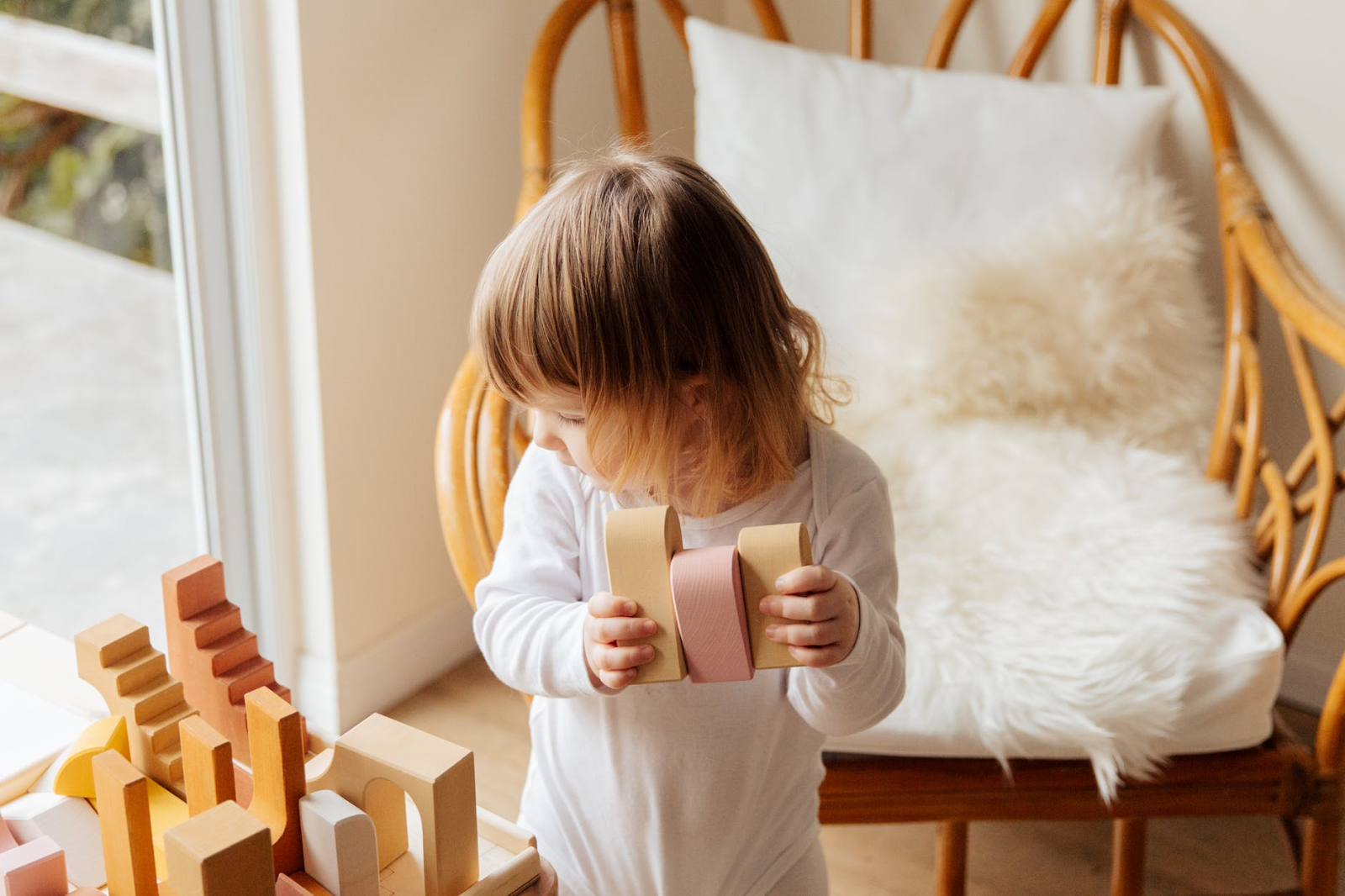
Image by Anna Shvets via Pexels
What Should You Be Looking For During The First Year?
There’s so much to be excited about as a new parent or grandparent. And you have so many things to look forward to, not to mention the gifts and well wishes you’ll receive. But there are many aspects of your infant’s development that you’ll want to keep track of during their first year. As well as watching for developmental milestones, you’ll also want to observe the following.
How often and how much your child feeds will change as they grow. You must keep track of this, as your child’s diet will significantly impact their development.
How long your child sleeps and when they wake up will depend on several factors, including their age and diet. As your child grows, their sleep schedule will change.
How often your child moves around will depend on their age and developmental stage. As they grow, your child will become more active and curious.
You’ll want to watch your child’s health, paying attention to any signs of something wrong.

Image by Gustavo Fring via Pexels
0-3 Months: Survival & Start Of The Basics
At two months, your baby will start to practice rooting. This is a reflex that newborns have, allowing them to find their mother’s breast. It’s a good idea to offer your baby the chance to root and suck before they’re ready to feed. At two and a half months, your baby should also be able to:
Newborns have very weak muscles, often having trouble lifting their heads. But by two and a half months, your baby should be able to raise its head off the ground.
Around two and a half months old, your baby should be strong enough to sit with support. If you put your baby in a sitting position, they may stay sitting up without help.
When your baby is two and a half months old, they should start to recognize and respond to the sound of your voice.
When light hits your baby’s eyes, they should blink. This happens to protect the infant’s eyes from damage.
3-6 Months: Pushing Up, Smiling, & Showing Interest In Faces
Some major developments start to happen at this integral part of your baby’s life. At three months, your baby should be able to:
Lift Their Head And Chest Off The Ground
Newborns usually lie flat on their backs, but your baby should be strong enough to push themselves up into a sitting position at three months. It’s essential to support their back so that they don’t fall over.
Push Their Palms Against A Hard Surface
At three months, your baby should be able to push their hands against a table or other hard surface. This is the beginning of hand-to-face behaviour.
Smile When Someone Talks Or Makes A Loud Noise
By three months, your baby should be able to smile when they hear you talking or if they hear a loud sound.
Pay Attention To Your Face And Voice
Three months is a great time to start talking to your baby. They should be able to focus on your face and respond to the sound of your voice by the time they’re three months old.
Respond To Having Their Feet Tickled
Your baby’s feet should have a sensation at three months. They should be able to feel a light tickle on the soles of their feet and respond to the feeling.
6-9 Months: Recognizable Cooing, Babbling, & Hand-to-Face Behaviors
By six months, your baby’s development will be in full swing. They should be moving around a lot and getting into everything. At six months, your baby should be able to:
At six months, your baby should start making soft sounds like “coo.” This is the beginning of babbling, and it’s a sign that your baby is feeling happy and content.
At six months, your baby should be able to recognize your voice. They should react when you speak to them, even if they don’t understand your words.
Babies are often happiest when they’re with their mothers. At six months, your baby should be able to smile when they see you, even if they’re not feeling particularly happy.
Smile Back At Other People
When other people smile at your baby, they should be able to smile back. They may not be able to keep a big smile on their face, but they should be able to react to other people.
Contribute To A “Conversation”
You may notice that your baby occasionally tries to talk to you. At six months, they should be able to participate in a “conversation” with you. They may not always say something that you can understand, but they should be trying to talk to you.
9-12 Months: Standing, Walking, and Talking? Maybe Not…
The first year of a baby’s life is filled with many exciting developments, but not all are easy to see. Babies’ brain development is a slow process that doesn’t happen quickly. You can expect your baby’s cognitive development to follow a very different pattern from his physical development. For example, the ability to walk and talk at a certain age does not reflect how developed their brain is.
Next, as your baby enters their 9th and 10th months, they may start to stand. This may sound like a big achievement. However, they likely won’t be able to balance or walk just yet. Instead, they may first use their hands to support themselves as they get to their feet. During this stage, your infant’s entire body will start to become stronger, which means that they may take their first steps at a later stage.
While many babies learn how to walk between their 12th and 15th months, some may still not be walking at 18 months. In fact, only 25% of babies walk before their first birthday. This is completely normal, and there’s no need to worry if your baby isn’t walking by 12 months.
12-18 Months: Words, Sentences, and Symbolic Behaviors
At about 12 months, you may notice your baby starting to experiment with words. They may even say a few words, such as “no,” “mama,” or “dada.” Most babies, however, do not start putting words together until they are closer to 15 months. By 18 months, your baby should be saying single words, such as “dog,” “book,” “car,” etc. They will also be able to put simple two-word sentences together, such as “walk ball,” “eat car,” etc. They may not be able to have a full-blown conversation with you just yet, but she’s definitely on her way.
Many babies start to show an interest in letters, numbers, and counting. This is a good sign that they are cognitively ready to learn. You can start reading to your child and encourage him to play with toys that promote cognitive learning. During this time, your little one will also develop their symbolic thinking. This means they will start to see things as more than just what they appear to be. This is a crucial step toward learning. In fact, symbolic thinking is one of the most important developments in early childhood. It means that your baby is becoming more aware of their environment and more connected to their feelings.
18 Months – 2 Years: Language Explosion!
During this period, your infant will likely become a chatterbox! They will continue to use words and sentences and start to understand more complex concepts. In addition, your baby may begin to ask a lot of questions. This is because they’ll see the world around them as something that needs to be understood.
You’ll also likely notice some changes in your baby’s behaviour. They’ll begin to show signs of being more independent, and they’ll be able to understand more about the world around them. During this time, your baby will also be able to use language more symbolically. They’ll be able to ask complex questions, and they’ll be able to use language to express their emotions.
2 years +: The Road Ahead
As your child gets older, their social skills will continue to improve. They will likely start to enjoy playing with other children, make friends, and want to spend time with other kids. At around 2 years, your child will be able to understand simple concepts, such as sharing, taking turns, and being gentle. You can encourage them to develop these social and cognitive skills by playing interactive games, such as hide-and-seek.
By the time your child reaches the age of 3, they will be able to understand concepts such as time and money. You can use this time to teach your child about these important things. And your child will likely be completely independent. Their language skills will be near an adult level, so they will be able to understand complex concepts and might be ready to go to school.

Image by Tatiana Syrikova via Pexels
What’s A Normal Delay In Infant Development?
As we’ve mentioned, every child develops at their own pace. Although your baby’s development may follow a typical pattern, they may develop and grow at a different rate than other infants. In addition, your child’s development may be delayed if they experience an illness. During these times, they may be behind in their developmental milestones.
If you notice some developmental delays in your infant, don’t panic. Instead, simply speak to your paediatrician about a normal delay in infant development. Together, you can work out a plan to help your child catch up to where they should be. There are plenty of sources of information online, too, which will help. Like this blog post about When Can Your Baby Sleep On Their Stomach? 4 Signs To Watch For. Of course, there are negatives about being online, but a positive is that great info and support are available to you at the click of a button.
This is a collaborative post